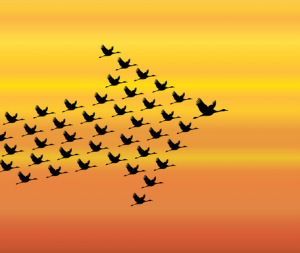This is the final installment of our SQUIRCLE blog series, covering a 2020 interview of SQUIRCLE Founder Francis Cholle, conducted by Adélaïde Barbier.
If you haven’t already, visit Parts I, II, and III in this series.
In Part I, “SQUIRCLE: A New Way to Think for A New World,” we introduced you to the definitions and principles of our work and philosophy.
In Part II, “SQUIRCLE: A Serious Game” we explored The SQUIRCLE Game and the reasons it is so essential to be playful in business.
In Part III, “SQUIRCLE: Applied to Business and Leadership” we demonstrated SQUIRCLE in action by applying our concepts and activities to business problems and real-world solutions.
In Part IV, we will dive into the work Francis has faced at the helm of The SQUIRCLE Academy, walking you through case studies and the reinvention of world-renowned businesses.
Could you walk us through the exemplary revival of Ralph Lauren Parfums?
In 2010, the American brand Ralph Lauren Parfum was in a strong decline (-25% growth). There was a great temptation to forcefully recover sales by focusing everything on commercial and promotional techniques at the risk of reducing margins and investment in product development. But the global president of the brand was able to unite his teams and consulting agencies around a radically innovative approach.
Our collaboration and the transformation of his mindset allowed him, at a critical time, to reverse his perspective on the development of a collection of four fragrances for men called Big Pony.
“Working with Francis Cholle is more than exciting. It is always very interesting and very stimulating. His approach helps reach the root cause of any business challenge and it systematically enriches any thought process with a lot of depth and rich perspectives. I only wish I had met him earlier in my career.”
— Guillaume de Lesquen, Global President Ralph Lauren Fragrances
From a purely transactional approach, he moved on to an empathetic and archetypal understanding of his customers and generated a product that met as much the needs of the time as those of the brand. Before the concept was even in the vernacular, he orchestrated the shaping of the brand’s raison d’être (reason for being) resulting in a double-digit capitalized annual growth rate (CAGR) in a single year and doubling the growth of the global market over five consecutive years.
Any other examples pulled from your practice?
Here is another direct illustration regarding a billion-dollar US media company called Hachette Media.
At a time when the media industry was upset by a plethora of new start-ups with disruptive offerings and revenue models, the CEO had to accept that he had no clarity about the future but that it shouldn’t hamper his ability to lead his direct reports, inspire his people, make decisions and take action.
One day, after an intense one-on-one session, because a lack of clear vision of the future was unsettling to him, he eventually accepted that the “vision was the reinvention.” He also admitted that despite the constant pressure of the headquarters, the culture in the US division had to change from being financially driven with quarterly reports ruling their calendars to becoming more entrepreneurial and willing to experiment and take more risks, in the absence of a clear strategy and set roadmap.
But this had to turn into a new, day-to-day reality, starting with the way his direct reports would rethink their business and adopt a new leadership mindset and behaviors. The holding had to invest in the digital transformation of their business, yet it was carrying costs that were now too high given the fact that a few important household name magazines like Metropolitan Home had to be closed for lack of advertising revenues due to a decline in readership. At the same time, Elle magazine was doing remarkably well. That same year it had sold more advertising pages than Vogue magazine, a business milestone in the history of the iconic French magazine in its US incarnation.
To help get all executive team members to agree to invest time or budget in the digital transformation of the business model was not an easy feat. The SQUIRCLE Game helped a lot. The SQUIRCLE Game acts as a harmonizer, just like an orchestra tunes their instruments to the A note that the first violin gives to all musicians. It might seem esoteric, but it works.
They practiced the SQUIRCLE Game regularly each time their Executive Committee was meeting. The SQUIRCLE Game enabled them to understand that in full uncertainty you don’t necessarily need a clear vision to reach your goal. They were able to accept the unexpected “vision as the reinvention,” even if it felt somewhat blurry to the SQUARE profiles. They saw that they didn’t need to agree on the path forward either, which appeased tensions and allowed a space for disagreement without brutal confrontation.
At the same time, they experienced firsthand that it required a different type of leadership (more receptive and less opinionated, which is hard when dealing with a burning platform) and a different type of navigation: day by day evaluation, moment to moment vigilance, overall acceptance that not having the upper hand was not a problem in and of itself but do not accept this uncertainty was either paralyzing or leading to willful force, which of course without fail produces misjudgments and exhaustion. This new approach to business trickled down throughout the organization. It triggered a sense of possibility and calculated risk.
The company won 6th place on the App Store for a media digital solution invented in-house that people could download on their phone. The company regained profitability in less than a year. Soon after it was sold to Hearst as part of a global sale of all media activities decided by the shareholder and global CEO.
“The Intuitive Compass® is not just a concept, it works! I had a first-hand experience working with Francis, and his methodology is both fun and effective. He has decoded the new meaning of success for individuals and organizations in the new economy. Anyone looking to reinvent legacy business models through creative and sustainable innovation should work with him and his model.”
— Philippe Guelton, EVP, COO, Hachette Media US
Two years later we got rehired by the former CEO of Hachette Media US who took on Lagardère Sports and Entertainment, EMEA. Due to digital channels, that division was also heavily disrupted. The financial state of the business was even steeper. The organization was also more complex due to multiple countries, sports, and business models. Nevertheless, we got the same results.
In less than a year, the business turned around with profitability, business growth, and financial risk brought back to green.
In a COVID and post COVID world, how do we regain nature and make it central to our lives?
This is the fundamental objective of SQUIRCLE: to reconnect us — through intuition and instinct — with the intelligence of nature in us.
McKinsey Global Institute conducted extensive research about innovation. It showed that when pursuing innovation the focus should be equally — if not more — on people and culture as we process and structure.
Once professionals and individuals use a SQUIRCLE mindset to fluently tap into their natural abilities for complex problem solving and decision making in uncertainty, we will have made substantial progress.
One decision at a time, we will surely move towards a more innovative and more sustainable future.
Did you start the SQUIRCLE ACADEMY to reach a wider audience?
In addition to my SQUIRCLE book, I have launched The SQUIRCLE ACADEMY. Its purpose is to bring to as many companies as possible the same principles and techniques that The Human Company brings in our management consulting assignments to help some of the most successful global companies transform and thrive in disruption.
At SQUIRCLEACADEMY.com executives, managers, entrepreneurs, and professionals can access:
- Original outcome-based e-learning courses
- Off-the-shelf workshops facilitated by our certified coaches to boost communication, collaboration, adaptation, and innovation
- Training programs (customized with and for their specific needs)
- Certification track to become a SQUIRCLE coach in their own company, or as independent agents working for our various clients or their clients.
I believe in the power of a purpose-driven community — everyone aspiring to a shared vision, making a difference in the world, upholding principles that maintain the integrity of it all, and moving us forward. This is why this certification program is one of our priorities at The SQUIRCLE ACADEMY.
Moved by the same spirit, we also created the KNOW BETTER WORLD FOUNDATION, targeting more specifically women, who still have to overcome in so many ways the invisible barriers.
Is there one last thing you would like to share?
During my 15-year practice, as I mentioned earlier, we have trained and worked with about 250,000 business students and executives. We’ve heard from many that it changed them beyond their professional life. I sincerely hope that we will be able to affect many more people with SQUIRCLE.
Organizations can reinvent themselves.
I’ve seen this happen even with large global businesses in free fall, due to broken business models, disrupted industries, and very tough economic environments.
To make this possible, the work has to start at the top but then quickly this new way of thinking needs to cascade through the ranks to make the transformation process possible, efficient, and durable. That’s essentially the raison d’être (reason for being) of SQUIRCLE.









